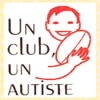Always on the field—but now on its outskirts—remains this sports enthusiast, especially passionate about rugby, a sport he knows well and about which he has written significant historical accounts. However, Doctor Julien’s son turns into Mister Schramm during the free time afforded to him by the club to serve as the President of a Nice-based association aimed at facilitating the integration of autistic children into the big rugby family. Founded in June 2002, “One Club, One Autistic” received a warm reception from the French Rugby Federation, which supports the initiative, and has notable patrons such as Thomas Castaignède and Thomas Lièvremont, key figures in the French team.
Today, over sixty children have been integrated into clubs, allowing not only for the socialization of the autistic child but, equally important, the opportunity for “normal” children to interact with and learn to live alongside disability.
Let’s meet Julien, who will explain why and how he decided to devote his time to turn this remarkable effort into a success.
Nice Premium: Julien, can you tell us about your association ‘One Club, One Autistic’?
Julien Schramm: It was born in 2002 from a project to integrate my son, Baptiste, who is autistic, into the Nice rugby school. At that time, he was 7 years old and had just left primary school to join a specialized medico-educational institute. In a sense, he was leaving the “normal” environment to truly enter into the world of disability. Non-verbal and not following instructions, he was an alien to the school, which didn’t quite know what to do with him. A hindrance to the progress of other children, all destined for a bright future—I say this with some irony, but it’s a reality: our country generally does not integrate disability well. Disability is feared, it reflects a negative image. Our country protects itself from it.
So, I sought to use Wednesday afternoons to allow Baptiste to remain in contact with “normality,” a factor in socialization. Close to a coach at the rugby school, we attempted Baptiste’s integration with the help of a sports science student. The experience was so positive that we decided to turn it into a project supported by an association: to develop the integration of an autistic child into a club, hence the name “One Club, One Autistic.”
NP: How do you become the President of such an association?
JS: When you’re a parent and want to make a difference. Before having Baptiste, I was like all French people; I knew nothing about disability in general. I had never encountered disability, not at school, college, university, work, or in clubs… By hiding the disabled, France renders its citizens inept. Baptiste opened my eyes. That’s why integrating the disabled is a real challenge for our country. A hypothesis: let’s integrate a disabled child into every class in all the schools in France.
And in 20 years, you’ll have a transformed society because you will have taught an entire generation how to behave appropriately in the face of disability. It’s just a hypothesis because integration requires resources and expertise. A poorly prepared integration can have very negative effects, especially rejection.
NP: What does rugby bring to young autistics… and vice versa, of course?
JS: First, a form of socialization they don’t get in specialized institutes. Plus, a practice that allows essential cognitive development. The ball, the group, the space… everything is combined to help the autistic child open up to the world around them. It’s also about teaching difference to the other children… Rugby, a citizen sport, is an educational sport par excellence.
NP: How many children are integrated to date and in which clubs?
JS: About 60 across France. I could not list all the clubs. But partnerships with major institutions like the FFR, UNAPEI, and FFSA have been crucial in developing the project. My status as a senior reporter at L’Equipe until last year was obviously an asset at the beginning for opening doors, but when the idea is good, it always ends up working. It should be noted that integration has a cost: about €2,000 per year, meaning today a budget of €120,000 annually that the association could absolutely not sustain without the help of UNAPEI and FFSA.
NP: What are President Schramm’s projects?
JS: That “One Club, One Autistic” should no longer be an association but a national project supported by major institutions. I’m working on it. Normally, the association will cease at the end of 2007, to let UNAPEI, FFSA, and FFR permanently include this project in the French landscape.
NP: The Rugby World Cup is coming in a few weeks. Will the Federation make room for “One Club, One Autistic”?


